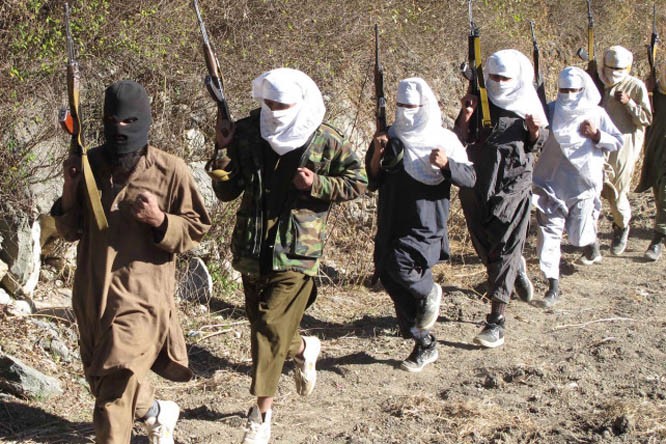
Freeing Islam from the shackles of militancy would necessitate every Muslim majority state to ‘think globally, act locally’

Every time, militant Islamists strike somewhere, the question of whether or not Islam is equivalent to unbridled violence comes in the limelight. Muslims generally take either of the two positions: either they seek to justify violence because ‘jihad is an essential part of Islam’ or they get defensive and condemn the militant violence on the ground that ‘Islam is a religion of peace’. One simply cannot resolve the riddle of the presence or absence of violence in Islam until one understands the very essence of the religion.
Is Islam political or apolitical religion in essence?
For many people, like Christianity and Judaism, Islam is a divinely revealed religion. For Islamists, however, Islam is a complete code of life that deals with each and every aspect of human existence ranging from religious to political to economic and from social to cultural; the list is not exhaustive. In brief, that Islam deals with everything under the sun is an article of faith with Islamists. An Islamist is a person who lays claim to power in the name of religion in order to implement Islam as a system of government either violently or nonviolently. This way, there are two types of Islamists.
Democrat Islamists vie for power through contesting elections. In the context of Pakistan, they are the likes of Jamiat Ulema-e-Islam (JUI) and Jamaat-e-Islami (JI) -- two main Islamist political parties. On the other hand, militant Islamists seek to seize power through armed struggle. Taliban in Afghanistan and Pakistan, ISIS in Iraq and Syria are the two main examples. What differentiates the two types of Islamists is not the end, implementation of Islam as a system, they seek, but the means they pursue.
Is Islam a political religion?
Islam is a political religion. The Holy Prophet (PBUH)’s life in Madina, constituting ten years, is the political manifestation of Islam. The Holy Quran says: "(Muslims are) those who, if we give them power in the land, [they] establish the system of salah (worship), give zakat (charity) and enjoin virtue and forbid evil." (22:41). What is manifest in Islam in general and in the verse in particular is that politics, authority or power, is in the service of religion and not vice versa.
Similarly, subsequent to his migration to Madina, the Holy Prophet (PBUH) founded a tiny Islamic polity there. He was not only a Prophet but also head of the state and government. While in Madina, Muhammad (PBUH) also participated in some 24 expeditions called ghazwah. Thus, the fusion of religion with politics was perfected. Similarly, after the Prophet, the four pious Caliphs and the subsequent Umayyad and Abbasid dynasties possessed armed forces though these forces might not have been as organised and regular as are today’s militaries. Nevertheless, this should not blind us to the fact that Islam is an apolitical religion too. How is Islam an apolitical religion?
The Prophet (PBUH)’s life in Makkah, some 23 years, before migration to Madina is the example of the apolitical manifestation of Islam. The religion did not possess any state machinery to execute Islamic injunctions. Moreover, the Holy Prophet (PBUH) only discharged religious duties. Likewise, Makkan Surahs, revealed before migration to Madina, mainly deal with matters of Imaniyat, faith. Tawhid, the belief in the oneness of Allah, is accompanied by belief in Risalat, the prophethood, and the akhrat, life after death. Unlike the Madina Surahs that primarily address to Muslims, human beings as a whole are the subjects of the Makkan Surahs. More, building basic human moral character, such as urging speaking the truth, spending on the needy and condemning telling lies to quote a few examples, is one of the distinct features of the period.
Does Islam permit the use of violence?
The answer is both yes and no, depending upon the context in which force is exercised. In its political arena, Islam, like democracy and authoritarian regimes, does not permit the privatisation of violence. In the religion, the state has, what Weber says, "monopoly of the legitimate use of physical force within a given territory." Nevertheless, in its apolitical arena, Islam does not allow the use of violence as exemplified by the Prophet (PBUH)’s life in Makkah.
When it comes to militant Islamists’ violence across the globe, the reality of using coercive means by the non-state actors is far more complex. The Islamist militants justify their violence because the Prophet (PBUH) also waged jihad on several occasions, they argue. The position is untenable in the face of reality that only the Prophet (PBUH) could claim unconditional obedience because he said and did what was revealed to him from Allah. "Nor does he say (anything) of (his own) Desire. It is no less than a revelation revealed." (53:3-4). On the other hand, militant Islamists cannot and do not claim such legitimacy. Secondly, while jihad by the Prophet (PBUH) spared the noncombatants, children, elderly and women, Islamist militants target these easy targets at will. Thirdly, the Prophet (PBUH)’s jihad was against the non-Muslim enemy exclusively and not against every non-Muslim. The Islamists militants, on the other hand, not only target fellow Muslims but also the noncombatant non-Muslims.
Countering militant Islamism requires an aggressive approach on the part of moderate ulema to come forward and claim back the space ceded to ‘petty’ ulema long ago. Long overdue, Paigham-i-Pakistan, a unanimous fatwa investing the authority of declaring jihad in the state from 1800 ulema of all Muslim sects across Pakistan is a step in the right direction. Muslims need to replicate this effort to help drastically reduce the militant violence in their individual countries. Freeing Islam from the shackles of militancy would necessitate every Muslim majority state to ‘think globally, act locally’.